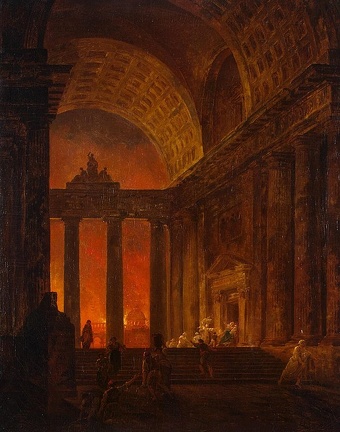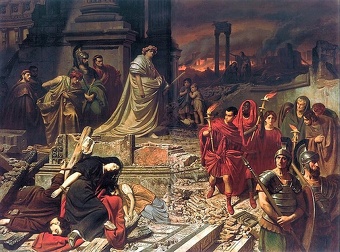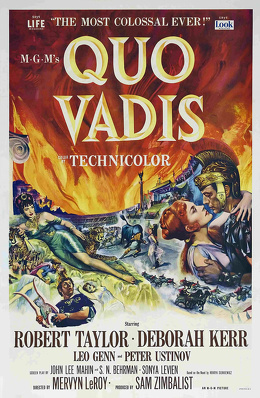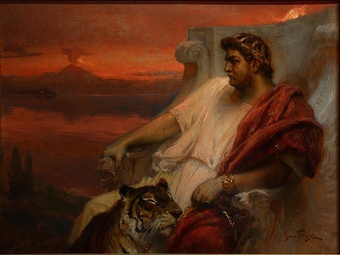Home | Category: Famous Emperors in the Roman Empire
GREAT FIRE OF ROME IN A.D. 64
The Great Fire of Rome took place in July, A.D. 64, in the tenth year of Nero’s reign. It is said the fore broke out in shops selling flammable goods in the Circus Maximus arena — famed for chariot races and entertainment.and ultimately burned down 10 of Rome's 14 districts. It was rumored that Nero burned Rome to the ground so that he'd have an excuse to build himself a new palace. Nero in turn, it is said, blamed the fire on a "rising cult," a reference to Christians. Today, historians say fires were common in ancient Rome and the Great Fire there could have easily been an accident.
According to Edward Gibbon the Great Fire of Rome "raged beyond the memory or example of former ages" for nine days. Of Rome's 14 regions, three were leveled and seven were devastated. In other accounts six were reduced to ashes. Many ancient temples and public buildings were consumed, such as the temple of Jupiter Stator ascribed to Romulus, and the temples of Vesta and Diana, which dated from the time of the kings.
Anthony Barrett, professor emeritus at the University of British Columbia at Vancouver and auth of “Rome Is Burning: Nero and the Fire That Ended a Dynasty:, draws on little-known Italian archaeological studies to reconstruct the tragedy and its consequences. While Barrett concedes that the extent of the devastation is almost impossible to pin down — there are no casualty figures, and we don’t know the name of one person who died in the fire — he finds it likely that the scale of human suffering was great. “The poor lived in high-rises that were notoriously dangerous — it is reasonable to surmise they were anywhere from five to eight stories high,” says Barrett. “The people who lived there would have been trapped.” [Source: Joshua Levine; Smithsonian magazine, October 2020]
RELATED ARTICLES:
NERO'S GOLDEN HOUSE AND THE REBUILDING ROME AFTER THE GREAT FIRE europe.factsanddetails.com ;
NERO (A.D. 37-68): HIS LIFE, DEATH, MOTHER AND WIVES europe.factsanddetails.com ;
NERO (RULED A.D. 54-68) AS EMPEROR: EARLY PROMISE, REFORMS, LATER REVOLTS europe.factsanddetails.com ;
NERO'S CRUELTY — TOWARDS HIS FAMILY, AIDES AND CHRISTIANS europe.factsanddetails.com ;
NERO’S BUFFOONERY, EXTRAVAGANCE AND STRANGE SEX LIFE factsanddetails.com
Websites on Ancient Rome: Internet Ancient History Sourcebook: Rome sourcebooks.fordham.edu ; Internet Ancient History Sourcebook: Late Antiquity sourcebooks.fordham.edu ; BBC Ancient Rome bbc.co.uk/history; Perseus Project - Tufts University; perseus.tufts.edu ; Lacus Curtius penelope.uchicago.edu; The Internet Classics Archive classics.mit.edu ; Bryn Mawr Classical Review bmcr.brynmawr.edu; Cambridge Classics External Gateway to Humanities Resources web.archive.org; Ancient Rome resources for students from the Courtenay Middle School Library web.archive.org ; History of ancient Rome OpenCourseWare from the University of Notre Dame web.archive.org ; United Nations of Roma Victrix (UNRV) History unrv.com
RECOMMENDED BOOKS:
“The Great Fire of Rome: The Fall of the Emperor Nero and His City” Amazon.com;
“Rome Is Burning: Nero and the Fire That Ended a Dynasty” by Anthony A. Barrett (2022) Amazon.com;
“The Great Fire of Rome: Life and Death in the Ancient City”, Illustrated, by Joseph J. Walsh (2019) Amazon.com;
“Nero: The Man Behind the Myth” by Thorsten Opper (2021) Amazon.com;
“Nero” by John F. Drinkwater (2021) Amazon.com;
“Nero” by Edward Champlin (2003) Amazon.com;
“Nero: Matricide, Music, and Murder in Imperial Rome” by Anthony Everitt and Roddy Ashworth (2023) Amazon.com;
“Evil Roman Emperors: The Shocking History of Ancient Rome's Most Wicked Rulers from Caligula to Nero and More by Phillip Barlag (2021) Amazon.com;
“Infamous Roman Emperors: Conquest, Sabotage, and Betrayal in the Roman Empire” by August Mead (2023) Amazon.com;
“From the Gracchi to Nero: A History of Rome from 133 BC to AD 68" by H.H. Scullard Amazon.com;
“The Neronian Grotesque” by Scott Weiss (2023) Amazon.com
“Chronicle of the Roman Emperors: The Reign-by-Reign Record of the Rulers of Imperial Rome” by Chris Scarre (2012) Amazon.com;
“The Twelve Caesars” (Penguin Classics) by Suetonius (121 AD) Amazon.com
“Emperor of Rome” by Mary Beard (2023) Amazon.com
“Emperor in the Roman World” by Fergus Millar (1977) Amazon.com
“Ten Caesars: Roman Emperors from Augustus to Constantine” by Barry S. Strauss (2019) Amazon.com
“Annals” by Tacitus (Penguin Classics) Amazon.com
“Histories” by Tacitus (Penguin Classics) Amazon.com
“Twelve Caesars: Images of Power from the Ancient World to the Modern” by Mary Beard (2021) Amazon.com
“The History of the Decline and Fall of the Roman Empire” by Edward Gibbon (1776), six volumes Amazon.com
Tacitus's Description of the Great Fire of Rome
Tacitus wrote: "During the night of July 18, A.D. 64, fire broke out in the merchant area of the city of Rome. Fanned by summer winds, the flames quickly spread through the dry, wooden structures of the Imperial City. Soon the fire took on a life of its own consuming all in its path for six days and seven nights. When the conflagration finally ran its course it left seventy percent of the city in smoldering ruins. [Source: Tacitus, “The Annals”, from Victor Duruy, “History of Rome” vol. V (1883); translated by Michael Grant, Eyewitness to History]
“Whether it was accidental or caused on the part of the emperor is uncertain — both versions have supporters. Now started the most terrible and destructive fire which Rome had experienced. It began in the Circus...breaking out in shops selling inflammable goods, and fanned by wind, the conflagration instantly grew and swept the whole length of the Circus, where it adjoins the Palatine and Caelian hills. Breaking out in shops selling inflammable goods, and fanned by the wind, the conflagration instantly grew and swept the whole length of the Circus. There were no walled mansions or temples, or any other obstructions, which could arrest it. First, the fire swept violently over the level spaces. Then it climbed the hills - but returned to ravage the lower ground again. It outstripped every counter-measure. The ancient city's narrow winding streets and irregular blocks encouraged its progress.
“Terrified, shrieking women, helpless old and young, people intent on their own safety, people unselfishly supporting invalids or waiting for them, fugitives and lingerers alike - all heightened the confusion. When people looked back, menacing flames sprang up before them or outflanked them. When they escaped to a neighboring quarter, the fire followed - even districts believed remote proved to be involved. Finally, with no idea where or what to flee, they crowded on to the country roads, or lay in the fields. Some who had lost everything - even their food for the day - could have escaped, but preferred to die. So did others, who had failed to rescue their loved ones. Nobody dared fight the flames. Attempts to do so were prevented by menacing gangs. Torches, too, were openly thrown in, by men crying that they acted under orders. Perhaps they had received orders. Or they may just have wanted to plunder unhampered.
“By the sixth day enormous demolitions had confronted the raging flames with bare ground and open sky, and the fire was finally stamped out at the foot of the Esquiline Hill. But before panic had subsided, or hope revived, flames broke out again in the more open regions of the city. Here there were fewer casualties; but the destruction of temples and pleasure arcades was even worse. This new conflagration caused additional ill-feeling because it started on Tigellinus' estate in the Aemilian district. For people believed that Nero was ambitious to found a new city to be called after himself. Of Rome's fourteen districts only four remained intact. Three were leveled to the ground. The other seven were reduced to a few scorched and mangled ruins."
Also, according to Tacitus: “the population searched for a scapegoat and rumors held Nero responsible. To diffuse blame, Nero targeted a sect called the Christians. He ordered Christians to be thrown to dogs, while others were crucified and burned.” [Source: Jamie Frater,Listverse, May 5, 2008]
Nero and the Great Fire of Rome
Joshua Levine wrote in Smithsonian magazine: “Nero wasn’t at home when the fire ignited. He was vacationing at Antium, today’s Anzio and another of his favorite getaways. But when news of the fire reached him, he hurried straight back to Rome and took charge — effectively — of firefighting efforts. He moved quickly to aid the victims. And in the fire’s aftermath, he introduced legislation to make Rome less vulnerable in the future. “For the relief of the homeless fugitive masses he threw open the field of Mars...and even his own gardens,” writes Tacitus. “Nero also constructed emergency accommodation for the destitute multitude. Food was brought from Ostia and neighboring towns, and the price of corn was cut to one-quarter sesterce a pound. Yet these measures, for all their popular character, earned no gratitude. For a rumor had spread that, while the city was burning, Nero had gone on his private stage and, comparing modern calamities with ancient, had sung of the destruction of Troy.” [Source: Joshua Levine; Smithsonian magazine, October 2020]
The reports which have come to us of the conduct of Nero during this great disaster are very diverse. Some represent him as gloating over the destruction of the city and repeating his own poem on the “Sack of Troy.” Other reports declare that he never showed himself in a more favorable light, exerting himself to put out the flames, opening the public buildings and the imperial palace for the shelter of the homeless, and relieving the suffering by reducing the price of grain. But it is charged that if he performed these charities, it was to relieve himself of the suspicion of having caused the conflagration. [Source: “Outlines of Roman History” by William C. Morey, Ph.D., D.C.L. New York, American Book Company (1901) \~]
Tacitus wrote: “Rumors soon arose accusing the Emperor Nero of ordering the torching of the city and standing on the summit of the Palatine playing his lyre as flames devoured the world around him. These rumors have never been confirmed. In fact, Nero rushed to Rome from his palace in Antium (Anzio) and ran about the city all that first night without his guards directing efforts to quell the blaze. But the rumors persisted and the Emperor looked for a scapegoat. He found it in the Christians, at that time a rather obscure religious sect with a small following in the city. To appease the masses, Nero literally had his victims fed to the lions during giant spectacles held in the city's remaining amphitheater. [Source: Tacitus, “The Annals”, from Victor Duruy, “History of Rome” vol. V (1883); translated by Michael Grant, Eyewitness to History] Nero was at Antium. He returned to the city only when the fire was approaching the mansion he had built to link the Gardens of Maecenas to the Palatine. The flames could not be prevented from overwhelming the whole of the Palatine, including his palace. Nevertheless, for the relief of the homeless, fugitive masses he threw open the Field of Mars, including Agrippa's public buildings, and even his own Gardens. Nero also constructed emergency accommodation for the destitute multitude. Food was brought from Ostia and neighboring towns, and the price of corn was cut to less than ¼ sesterce a pound. Yet these measures, for all their popular character, earned no gratitude. For a rumor had spread that, while the city was burning, Nero had gone on his private stage and, comparing modern calamities with ancient, had sung of the destruction of Troy.
“Nero's unpopularity increased because while much of the Rome's population suffered after the fire he built a massive palace, hugely extravagant even by Roman terms. Nero later blamed the burning of Rome on Christians. Thousands were executed by being forced to on the tar-impregnated "shirts of torture," which were set on fire.
Blaming Nero for the Great Fire of Rome in A.D. 64
Dio Cassius (c.155-235 A.D.) wrote: “Nero had the wish — or rather it had always been a fixed purpose of his — to make an end of the whole city in his lifetime. Priam he deemed wonderfully happy in that he had seen Troy perish at the same moment his authority over her ended. Accordingly, Nero sent out by different ways men feigning to be drunk, or engaged in some kind of mischief, and at first had a few fires kindled quietly and in different quarters; people, naturally, were thrown into extreme confusion, not being able to find either the cause of the trouble nor to end it; and meantime met with many strange sights and sounds. They ran about as if distracted, and some rushed one way, some another. In the midst of helping their neighbors, men would learn that their own homes were blazing. Others learned, for the first time, that their property was on fire, by being told it was burned down. People would run from their houses into the lanes, with a hope of helping from the outside, or again would rush into the houses from the streets seeming to imagine they could do something from the inside. The shouting and screaming of children, women, men, and gray beards mingled together unceasingly; and betwixt the combined smoke and shouting no one could make out anything. [Source: Dio Cassius (c.155-235 A.D.) from “Roman History, 62.16-18, William Stearns Davis, ed., “Readings in Ancient History: Illustrative Extracts from the Sources,” 2 Vols. (Boston: Allyn and Bacon, 1912-13), Vol. II: Rome and the West, pp. 191-195]
“All this time many who were carrying away their own goods, and many more who were stealing what belonged to others kept encountering one another and falling over the merchandise. It was impossible to get anywhere; equally impossible to stand still. Men thrust, and were thrust back, upset others, and were upset themselves, many were suffocated or crushed; in short, no possible calamity at such a disaster failed to befall.
“This state of things lasted not one day, but several days and nights running. Many houses were destroyed through lack of defenders; and many were actually fired in more places by professed rescuers. For the soldiers (including the night watch) with a keen eye for plunder, instead of quenching the conflagration, kindled it the more. While similar scenes were taking place at various points, a sudden wind caught the fire and swept it over what remained. As a result nobody troubled longer about goods or homes, but all the survivors, from a place of safety, gazed on what appeared to be many islands and cities in flames. No longer was there any grief for private loss, public lamentation swallowed up this — as men reminded each other how once before the bulk of the city had been even thus laid desolate by the Gauls.
“While the whole people was in this state of excitement, and many driven mad by calamity were leaping into the blaze, Nero mounted upon the roof of the palace, where almost the whole conflagration was commanded by a sweeping glance, put on the professional harpist's garb, and sang "The Taking of Troy" (so he asserted), although to common minds, it seemed to be "The Taking of Rome." The disaster which the city then underwent, had no parallel save in the Gallic invasion. The whole Palatine hill, the theater of Taurus, and nearly two thirds of the rest of the city were burned. Countless persons perished.
“The populace invoked curses upon Nero without intermission, not uttering his name, but simply cursing "those who set the fire"; and this all the more because they were disturbed by the recollection of the oracle recited in Tiberius's time, to this effect,
"After three times three hundred rolling years
In civil strife Rome's Empire disappears."
And when Nero to encourage them declared these verses were nowhere to be discovered, they changed and began to repeat another oracle — alleged to be a genuine one of the Sibyl,
"When the matricide reigns in Rome,
Then ends the race of Aeneas."
“And thus it actually turned out, whether this was really revealed in advance by some divination, or whether the populace now for the first time gave it the form of a sacred utterance merely adapted to the circumstances. For Nero was indeed the last of the Julian line, descended from Aeneas. “Nero now began to collect vast sums both from individuals and nations, sometimes using downright compulsion, with the conflagration as his excuse, and sometimes obtaining funds by "voluntary" offers. As for the mass of the Romans they had the fund for their food supply withdrawn.
Stories About Nero Playing Music During the Great Fire of Rome
Although Nero was fond of music and played a Roman instrument somewhat similar to a violin, there is no historical evidence that he played it during the fire. Rumors were spread that Nero enjoyed watching the fire and many Romans accused him of deliberately setting it.
Joshua Levine wrote in Smithsonian magazine: “Perhaps the rumor wasn’t even true. The evidence is murky. John Drinkwater, an emeritus professor of Roman history at the University of Nottingham, believes that it was true, however, and that Nero sang his head off. But Drinkwater doesn’t see Nero’s singing the way history has depicted it — as proof of Nero’s cruel indifference to the plight of his people. “I think anyone with Nero’s artistic susceptibilities would have reacted the same way. He’s written an epic on the sack of Troy and we know the Greeks burned Troy. So it wouldn’t surprise me if he goes to the modern Farnese Gardens, looks down and lets loose. He’d already done all he could to fight the fire, so he just responded to the flames. But if we accept that he did that, he leaves himself open to the charge of arson.” [Source: Joshua Levine; Smithsonian magazine, October 2020]
“Barrett largely agrees with Drinkwater about the singing. “We have a contemporaneous account by a witness to the Great Chicago Fire of 1871 who speaks of its ‘great beauty,’” says Barrett. “J. Robert Oppenheimer recited the Bhagavad Gita after witnessing the first explosion of the atom bomb. Scipio Africanus quoted Homer on seeing the destruction of Carthage. These are very human reactions to tragedy. Only in Nero is it seen as evil.” Like Drinkwater, Barrett takes a dim view of the charge that Nero set the fire: “The case against Nero is very flimsy.”
“Still, Nero’s musical response to the conflagration was indisputably a mistake. A few years later, Nero’s “artistic susceptibilities” would get him in even deeper trouble. If a modern well-wisher could send one word of counsel back through time, it would be this: “Dear Nero, please stop singing.”
Did Nero Cause the Great Fire of Rome?
The historian William Stearns Davis wrote: “Most historians charge Nero with having caused the great fire that nearly destroyed Rome in 64 CE. Modern criticism makes it very doubtful whether the Emperor really caused the fire; although his life was so iniquitous that people readily believed that he was guilty. The city of Rome was, for the most part, composed of very ill-built and inflammable insulae (tenement houses), and a blaze once under headway was almost impossible to check. In any case, the burning of Rome was one of the famous events of the age; and it is likely enough that thugs and bandits pretended they had the Emperor's orders, when they spread the flames in the hope of getting new chances for plunder. [Source: Dio Cassius (c.155-235 A.D.) from “Roman History, 62.16-18, William Stearns Davis, ed., “Readings in Ancient History: Illustrative Extracts from the Sources,” 2 Vols. (Boston: Allyn and Bacon, 1912-13), Vol. II: Rome and the West, pp. 191-195]
Speaking up in Nero's defense, the Italian archaeologist Ida Sciortino told National Geographic, "Please remember, a lot of the stuff was written by his political opponents...Nero was not fiddling while Rome burned. He realized that nobody could save the old wooden tenements near the Tiber from such an intense blaze. So he spent that time writing a stronger fire code and designing a new city. He started reconstruction one day after the fires were out." [Source: Robert Draper, National Geographic, September 2014 ~]
“This rehabilitation—this process of a small group of historians trying to transform aristocrats into gentlemen—seems quite stupid to me,” famed Roman archaeologist Andrea Carandini to National Geographic. “For instance, there are serious scholars who now say that the fire was not Nero’s fault. But how could he build the Domus Aurea without the fire? Explain that to me. Whether or not he started the fire, he certainly profited from it.” ~
Marisa Ranieri Panetta, the author of books on ancient Rome and Pompeii, told National Geographic: “Even Tacitus, the great accuser of Nero, writes that no one knows whether Rome burned from arson or by chance. Rome in Nero’s time had very narrow streets” and was full of tall buildings with wooden upper stories. “Fire was essential for lighting, cooking, and heating. Consequently almost all the emperors had big fires during their reigns.”
Robert Draper wrote in National Geographic: “While it seems the case that Nero did enjoy playing a stringed instrument known as the kithara, the first account alleging that he did so while watching flames consume the city was written by Cassius Dio a century and a half after the fact. Tacitus, who lived during the time of Nero, wrote that the emperor ordered the homeless to be sheltered, offered cash incentives to those who could expeditiously rebuild the city, and instituted and enforced fire safety codes.” ~
Image Sources: Wikimedia Commons
Text Sources: Internet Ancient History Sourcebook: Rome sourcebooks.fordham.edu ; Internet Ancient History Sourcebook: Late Antiquity sourcebooks.fordham.edu ; “Outlines of Roman History” by William C. Morey, Ph.D., D.C.L. New York, American Book Company (1901) ; “The Private Life of the Romans” by Harold Whetstone Johnston, Revised by Mary Johnston, Scott, Foresman and Company (1903, 1932); BBC Ancient Rome bbc.co.uk/history/ ; Project Gutenberg gutenberg.org ; Metropolitan Museum of Art, National Geographic, Smithsonian magazine, New York Times, Washington Post, Los Angeles Times, Live Science, Discover magazine, Archaeology magazine, Reuters, Associated Press, The Guardian, AFP, The New Yorker, Wikipedia, Encyclopædia Britannica, Encyclopedia.com and various other books, websites and publications.
Last updated October 2024




